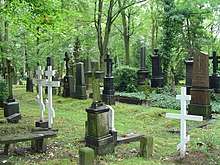Berlin-Tegel Russian Orthodox Cemetery
The Berlin-Tegel Russian Orthodox Cemetery (German: Russischer Friedhof Berlin-Tegel) is the only Russian Orthodox burial ground in Berlin. It is located on Witte street in the Tegel locality of the Reinickendorf borough. It is owned and operated by the Brotherhood of St. Prince Vladimir (Bratstvo).
 | |
| Details | |
|---|---|
| Established | 1892 |
| Location | |
| Country | Germany |
| Type | Christian Orthodox cemetery |
History and description
The cemetery at the Witte Road was established on about 2 acres of grounds that the Russian Orthodox Brotherhood of St. Prince Vladimir Bratstwo bought in October 1892 at a price of 30.000 marks. Until then, Orthodox Christians were primarily buried on existing mostly Protestant Berlin cemeteries.
The Friedhofskirche (cemetery church) of St. Constantine and St. Helena was built in 1894 and is the oldest of the three Russian Orthodox churches in Berlin, and the only one in Germany that has its own cemetery. It is situated in an industrial area near the motorway exit Holzhauser Straße. The gateway is covered by a beautiful carved roof, under which the nine cemetery bells are housed. The cupolas are crowned with orthodox crosses, which tower above small crescent moons in memory of old religious wars.
The church was designed and built by Albert Bohm, a member of the Prussian court architectural board. Two restored portraits of the Virgin Mary stand out under their icon ornamentation. They were donated by two monasteries on the sacred Mount Athos at the end of the nineteenth century.
When the cemetery was laid out, Tsar Alexander III sent 4.000 tons of earth from Russia, so that the Russian deceased could be buried according to tradition in native Russian soil.
Notables buried
Among the notables buried here are
- Vladimir Dmitrievich Nabokov, Russian criminologist, journalist, and progressive statesman during the last years of the Russian Empire, and father of the writer Vladimir Vladimirovich Nabokov, who died saving a political rival from an assassin.
- Vladimir Sukhomlinov, Russian Minister of War (1909-1915)
- Vladimir Sidorin, Commander of the White Don Army (1919-1920)
- The operatic composer Mikhail Ivanovich Glinka died in Berlin and is buried in St. Petersburg, but is remembered here with a memorial stone.
- The architect Mikhail Eisenstein, father of the famous film director Sergey Eisenstein, also commemorated here.
- Alexander Rimski-Korsakov, a nephew of the composer of the same name, also commemorated here.
Gallery
References
- Nikolaus Thon: Die russisch-orthodoxe Gemeinde zu Berlin bis zum Beginn des Ersten Weltkrieges. Aus: Der Christliche Osten, Würzburg 1986
- Klaus Hammer: Historische Friedhöfe und Grabmäler in Berlin, S. 321–324. Berlin 1994, ISBN 3-922778-32-1
- Rolf Richter: Aus dem Leben der Russischen Orthodoxen Kirche in Berlin, S. 68–69. Berlin 1999, ISBN 3-932180-69-0
- Wolf-Borwin Wendlandt, Volker Koop (Hrsg.): Ein Stück Russland in Berlin – Die Russisch-Orthodoxe Gemeinde Reinickendorf, S. 58–70. Berlin 1994, ISBN 3-89488-072-4
- Ralf Schmiedecke: Reinickendorf. Berlins grüner Norden. Sutton-Verlag; Erfurt 2003
- Dimitrij Rahr: Woswraschschenie Bratstwu chrama sww. rawnoapostol'nych Konstantina i Eleny i russkago kladbischschscha w Berline-Tegele (Rückgabe der Kirche der hl. Konstantin und Helena und des russischen Friedhofs in Berlin-Tegel an die Bruderschaft) (russ.), in: Bratskij Westnik № 21, Bad Kissingen 2006
External links
| Wikimedia Commons has media related to Friedhof der Russisch-Orthodoxen Gemeinde Berlin-Tegel. |
- berlin.de: Russisch-Orthodoxer Friedhof Tegel
- Seite der Hl.-Konstantin-und-Helena-Kirche
- Seite der Bruderschaft des hl. Fürsten Wladimir Bratstwo
- Erzpriester S.Taurit: Geschichte der russ.-orth. Gemeinde in Berlin
- Wolfgang Timmler: Russischer Friedhof Berlin
- Russische Kirche und Friedhof in Tegel (Kulturgeschichte Reinickendorf)
- Erwähnung des russ. Friedhofs in Berlin auf der Homepage des Bezirks Reinickendorf
- Eindruck vom Alexanderheim vor dem Abriss


